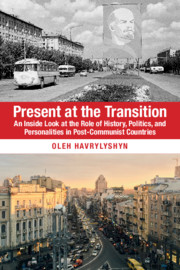 Present at the Transition
Present at the Transition Politicians, Technocrats, and Red Directors
from Part III - Domestic Vested Interests and Reforms
Published online by Cambridge University Press: 04 May 2020
Public opinion polls of transition populations reveal inter alia a surprisingly high degree of dissatisfaction with the outcome, even in Central Europe where objective measures of income and living standards show large improvements since 1989. This is closely associated to opinions that former communists “stole” state assets and became the new capitalist elite. Like most myths, this contains elements of truth, for indeed many former communists and insiders count among the new rich – especially in the USSR region. But this is far from the case in Central Europe, as has been shown by detailed studies of who the new elite is and what happened to the old nomenklatura. There, former political elites were largely replaced by formal or informal lustration; the only part of the nomenklatura that did relatively well were the Red Directors, especially mid-level managers of the socialist period. The chapter also discusses why many Central Europeans whose incomes have more than doubled are dissatisfied: unreasonable expectations of reaching, say, Austrian incomes were not met. The catch-up was “merely” 60–70 percent thereof. Dissatisfaction is not with incomes but with fact that “others”, the most successful new entrepreneurs, did much better.
To save this book to your Kindle, first ensure no-reply@cambridge.org is added to your Approved Personal Document E-mail List under your Personal Document Settings on the Manage Your Content and Devices page of your Amazon account. Then enter the ‘name’ part of your Kindle email address below. Find out more about saving to your Kindle.
Note you can select to save to either the @free.kindle.com or @kindle.com variations. ‘@free.kindle.com’ emails are free but can only be saved to your device when it is connected to wi-fi. ‘@kindle.com’ emails can be delivered even when you are not connected to wi-fi, but note that service fees apply.
Find out more about the Kindle Personal Document Service.
To save content items to your account, please confirm that you agree to abide by our usage policies. If this is the first time you use this feature, you will be asked to authorise Cambridge Core to connect with your account. Find out more about saving content to Dropbox.
To save content items to your account, please confirm that you agree to abide by our usage policies. If this is the first time you use this feature, you will be asked to authorise Cambridge Core to connect with your account. Find out more about saving content to Google Drive.